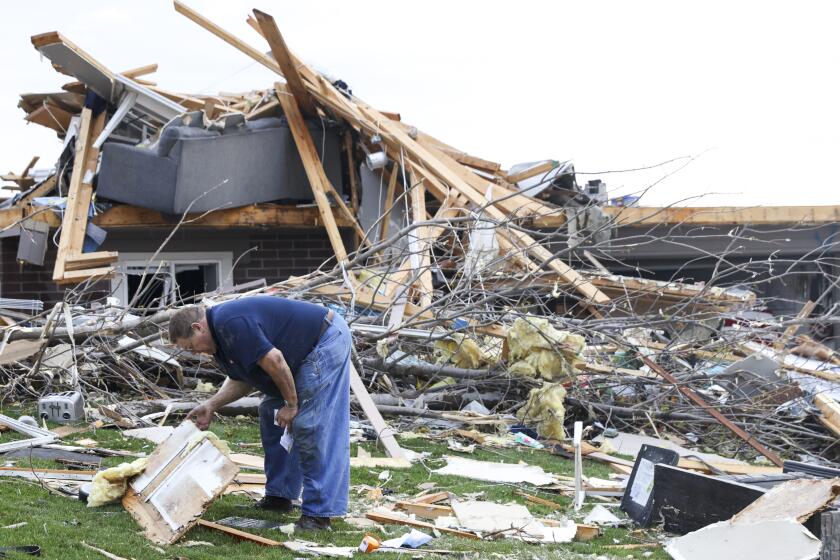Rebel Cleric Says His Forces Will Leave Mosque
Rebel cleric Muqtada Sadr announced Wednesday that he would accept demands to vacate Najaf’s Imam Ali Mosque and disarm his militia but insisted on further negotiations to work out how such a plan would be implemented.
The surprise announcement came just hours after Iraq’s interim defense minister warned that U.S. and Iraqi forces were on the verge of mounting an all-out assault to eject Sadr and hundreds of his armed supporters from the shrine, one of Shiite Islam’s holiest sites.
For the record:
12:00 a.m. Aug. 20, 2004 For The Record
Los Angeles Times Friday August 20, 2004 Home Edition Main News Part A Page 2 National Desk 1 inches; 41 words Type of Material: Correction
Condoleezza Rice quote -- An article in Thursday’s Section A about the situation in Najaf, Iraq, quoted national security advisor Condoleezza Rice, who was interviewed on Fox News Channel and CNN. The quote that appeared was from her interview with Fox.
The cleric’s offer was greeted with skepticism by some who considered it a stalling tactic and with hope by others who called it a starting point for renewed peace talks between Sadr and the government of interim Prime Minister Iyad Allawi.
“This is an entrance to negotiations,” Jalil Shammari, a member of the Dawa Party, said at a conference in Baghdad that named an interim national assembly Wednesday. The four-day conference, where 100 members of the interim National Council were chosen, spent much time discussing the situation in Najaf.
“A delegation from the government will go to Najaf, or a delegation will come from Najaf to the government to start the negotiations, which we hope will end the crisis,” Shammari said.
In a statement released late Wednesday, the Iraqi Defense Ministry did not say directly whether Allawi’s office would reopen talks. A previous attempt at negotiations collapsed Saturday after barely 24 hours.
Instead, the statement reiterated the government’s demand that Sadr and his Al Mahdi militiamen lay down their weapons and return the mosque to state control. “After that, we will halt all the decisions we’ve made with regard to Muqtada Sadr and his followers,” the statement said, without elaborating.
In Najaf -- where clashes flared even after Sadr issued his offer -- U.S. military planners said they had no plans to scale back or change direction unless instructed by the Iraqi government. Fighting throughout the day Wednesday injured or killed at least 29 people, including four children, Najaf health officials said. One U.S. Marine was also killed, officials said.
Both U.S. and Iraqi officials are leery that Sadr, a shrewd tactician with a history of accepting and reneging on such agreements, merely wants to buy time to regroup and reinforce his fighters.
“We’re still trying to figure out what it all means,” said Maj. Bob Pizzitola, executive officer of the 1st Battalion, 5th Cavalry Regiment.
The Bush administration reacted cautiously to Sadr’s offer. “I don’t think we can trust al-Sadr,” said national security advisor Condoleezza Rice. “We have seen many, many times al-Sadr assume or say he is going to accept certain terms and then it turns out not to be the case.” Rice spoke in television interviews on Fox and CNN.
On Tuesday, Sadr had refused to meet a high-profile delegation dispatched by the national conference to propose a way out of the violence in Najaf, which has claimed scores, perhaps hundreds, of lives since it broke out Aug. 5.
Kept waiting in the besieged Imam Ali Mosque for three hours, the group conveyed its message to Sadr’s aides but gave up on seeing the cleric, returning to the Iraqi capital late in the night with its written communique still in hand.
Hours later, the conference ruled out trying for another meeting. Separately, Defense Minister Hazem Shaalan told reporters Wednesday that Iraqi troops, backed by U.S. forces, were ready to raid the shrine -- possibly even later in the day -- although there was little evidence of activity or a large mobilization at the American military base outside Najaf.
Late Wednesday afternoon, Sadr sent word to the conference that he had agreed to its peace proposal, at least in principle. In exchange for leaving the mosque and giving up their weapons, Sadr and his followers would be granted amnesty and encouraged to turn their guerrilla movement into a political organization.
According to a letter read out to the national gathering, Sadr said his decision was an effort “to stop the bloodshed in Iraq and to build a new Iraq, which needs the efforts of everyone.” If the plan falls apart, “responsibility for failure of the negotiations will be on everybody,” warned a separate letter from Sadr’s office in Baghdad.
But how such proposals are to be carried out -- especially the demand to disarm -- has been the sticking point that has unraveled previous agreements with Sadr, including a deal reached in the spring to end a similar uprising. Then, Sadr agreed to lay down arms, only to wind up stockpiling more.
Over the weekend, the cleric’s aides said he was again prepared for his militia to give up its weapons, “except for self-defense.”
Since the U.S. invaded Iraq last year, none of the country’s known militias is believed to have disarmed, including the Shiite militant group Badr Brigade, despite pledges to do so.
Spokesmen for Sadr suggested a cease-fire with U.S. and Iraqi forces while details for implementing the national conference’s peace plan were ironed out. But a truce appeared unlikely in light of the government statements issued Wednesday.
“The government shouldn’t continue its bellicose tone with him as if they were holding a gun to his head,” complained Mahmoud Soudany, an aide to Sadr in Baghdad. “They should resort to dialogue.”
Throughout the two-week confrontation, Sadr has kept Allawi’s government off balance with a mixture of appeals for peace and vows to fight to the death.
For his part, Allawi has declared his determination to crush all armed groups in Iraq.
Complicating that pledge in Najaf, however, is the gold-domed Imam Ali Mosque, which has proved to be Sadr’s most effective defense so far. Sadr, the Iraqi government and U.S. officials all know that any attack on the shrine would provoke widespread anger, and possibly violent unrest, among Iraq’s majority Shiites, especially if American troops were at the vanguard of the assault.
Iraqi officials have decided that any raid would be led by Iraqi troops, despite the private misgivings of some U.S. military commanders as to the Iraqi forces’ ability to pull off such a risky operation.
“The only American intervention would be for airborne protection and also securing some of the roads that lead to the compound,” Shaalan, the defense minister, said Wednesday. “As for entering the compound, it will be Iraqis 100%.”
Shaalan and U.S. Lt. Gen. Thomas F. Metz, the commander of multinational troops in Iraq, met in Najaf on Wednesday for a second day to map a plan to evict Sadr’s forces from the shrine.
A Marine was killed and another wounded when a mortar round struck them in the cemetery north of the mosque, a sprawling graveyard where some of the fiercest battles have taken place. U.S. troops tracked the source of the attack to a parking garage and shelled the structure.
Nine servicemen have died in Najaf since fighting began Aug. 5. The U.S. says it has killed more than 300 militants, but Sadr’s deputies say the number is only a few dozen.
Outside Najaf, the biggest battlefield has been Sadr City, the large slum in Baghdad named after the cleric’s widely revered father.
From noon Wednesday until late evening, U.S. armored vehicles pushed into the slum from the south, under fire from small arms and rocket-propelled grenades. A U.S. officer said that more than 50 militants firing on troops were killed.
“This is the first time the Mahdi militia has had to fight across the entire width of Sadr City,” said Lt. Col. Lopez Carter. “They don’t have the equipment. They don’t have the discipline, they don’t have the communication infrastructure in place.”
Elsewhere, a militant Shiite group claiming to have kidnapped missing French American journalist Micah Garen said it would kill him if U.S. forces did not withdraw from Najaf within 48 hours. Garen and an Iraqi interpreter have been missing from the southern city of Nasiriya since Friday.
Chu reported from Baghdad and Sanders from Najaf. Times staff writer David Holley in Baghdad contributed to this report.
More to Read
Start your day right
Sign up for Essential California for news, features and recommendations from the L.A. Times and beyond in your inbox six days a week.
You may occasionally receive promotional content from the Los Angeles Times.







